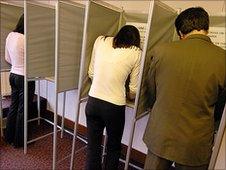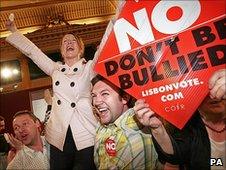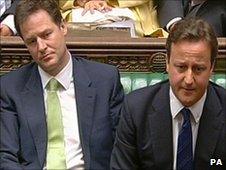Voting referendum: Sides mobilise over electoral reform
- Published

The public is being asked to change fundamentally the way MPs are elected
Nick Clegg has fired the starting gun for what looks likely to be a bitter battle over how the UK Parliament elects its MPs.
After announcing that a referendum on the Westminster voting system is to be held next May, the deputy prime minister was criticised from nearly all sides of the House of Commons.
Scottish and Welsh nationalist MPs, as well as Northern Ireland MPs, are unhappy that the vote is being scheduled for 5 May - the same day as elections for the devolved parliament and assemblies - fearing it will overshadow them.
Many Conservative and Labour MPs, meanwhile, are concerned that voters in England - despite council elections being held in some parts of the country that day - will have less impetus to take part and this will lead to huge fluctuations in overall turnout and a potentially distorted result.
"It is an attempt to fix the result and sets a very bad precedent for future referendums," argued Tory MP Bernard Jenkin, adding that it should be held a month later.
"If there is a referendum, then it must be fair and have credibility. It will not have a credibility if it is held on the same day."
'Ducks in a row'
Even Lib Dem MPs were noticeably reticent in their support for the proposals during the exchanges after Mr Clegg announced the plans in the Commons.
Among the few people seemingly happy with the date are campaigners for electoral reform, who have been mobilising for this moment since it became clear the government was committed to a vote on the issue.
James Graham, from Unlock Democracy - a campaign group which has long called for the existing first-past-the-post system for choosing MPs to be replaced - says May is "ideal" and says he is not worried about a potential clash with elections in Scotland, Wales and Northern Ireland.
"From that perspective, it will increase turnout," he argues.
The "yes campaign" is looking to build the broadest coalition possible to put the case for change, he says.
"We have already got our ducks in a row. Different organisations are working very cohesively together."
Up and running
But they know they have got a lot of work to do to generate awareness of the issues at stake and sustain interest in them between now and next spring.
"The real challenge is whether the campaign will be able to inspire people," James Graham admits.
"There is an issue of whether by polling day people will understand what they are voting for."
The "no campaign" might be unhappy with the proposed date - which along with the referendum itself must be approved by MPs this autumn - but they are also gearing up for the fight, already raising money to set up an office and beginning focus groups.
"It is important to have a balanced debate," says Conservative MP Daniel Kawczynksi - who is leading efforts to build an alliance of Tory and Labour MPs behind the current electoral system.
"For the sake of a well-informed and fair referendum it is pivotal for us to be able to explain the great benefits of first-past-the-post and its inherent fairness," he says.
Arguments about the relative merits of the current first-past-the-post system, as opposed to alternative vote, are likely to be bandied about like confetti over the coming months.
But are concepts such as second preferences, constituency links and share of the vote really going to become part of the national conversation?
A senior figure within the no campaign believes not.
Voting on what?
While he says his supporters will be arguing strongly that the alternative vote system is "complex" and can lead to "odd" results, he is certain that it won't be the minutiae of the different systems that sway people.
"Referendums are rarely about the question on the ballot paper," says the source, who did not want to be named.
Citing the examples of Irish votes on the Nice and Lisbon Treaties and the 1999 plebiscite in Australia on whether to become a republic, he says that wider factors - ranging from the popularity of the government, the state of the economy and the prevailing national mood at the time - determine the result.

Referendums can be an opportunity to pass judgement on other issues
On that basis, Labour's 2004 defeat in a referendum on creating an assembly for the north-east of England - a result that the no campaign is using as its template - could be attributed to a backlash over Iraq.
But with the coalition government in its early stages - and its partners on different sides of the argument over electoral reform - what voters will feel about it in 10 months' time is pretty hard to predict, particularly with the UK facing the harshest public spending cuts in a generation.
At this stage, with polling suggesting public opinion is divided on the issue, the source says the referendum is "entirely winnable for both sides".
Party involvement
Much may depend on the role played by the party leaders - particularly David Cameron and Nick Clegg - and how visible they are in the campaign.
No 10 has suggested that while the prime minister will campaign against changing the electoral system, he will not be going around the country on a "soapbox" doing so.
Both campaigns are keen to downplay the involvement of the political elite, stressing that politicians still remain deeply unpopular after the expenses debacle and this issue is too important to be left to Westminster to decide.

The vote could be crucial to the future of the coalition government
"It is not going to be about party labels," says Ashley De, from the Electoral Reform Society.
"This is now going to be a national debate and not down to a few hundred MPs to decide. It is high time this debate is pulled out of Westminster."
Others - perhaps with the memories of what they believe was Labour's post-1997 betrayal over electoral reform in their minds - put it more strongly.
"There is no way we are going to be co-opted by the parties. We are not going to make that mistake," says James Graham, from Unlock Democracy.
"It is about giving the people a greater voice not giving politicians a greater voice."
But as both sides go about building organisational structures and honing their messages, it does raise the question of who will front their campaigns and take this issue beyond theoretical discussions and into people's living rooms?
That remains one of the many questions - including what the impact the vote will have on the future of the coalition - that remain to be answered in the months ahead.
- Published5 July 2010
- Published2 July 2010
- Published2 July 2010